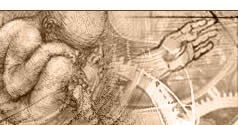 |
 |
 |
 |
 |
 |
 |
 |
|
 |
 |
 |
63 Anthropic principle
|
| Menu | back |
The anthropic principle refers to the incredible fine-tuning of the various natural constants. If even one of the over forty known natural constants was to deviate minimally from its present value, life would not be possible on the Earth. Some scientists who do not believe in an intelligent creator of the universe solve this dilemma with the so-called multiversum theory that postulates an infinite number of universes. Further, it also claims that we live in precisely that universe in which life is possible. Naturally, it is possible to prove everything and nothing with such a theory.
The probability that our universe corresponds to precisely one specific manifestation is approx. 1:10^62 in the opinion of some physicists. This corresponds to:
0.000'000'000'000'000'000'000'000'000'000'000'000'000'000'000'000'000'000'000001% (1).
One physicist clarifies the precision of the fine tuning of natural constants in the following manner. Imagine a two-Euro coin which had to be hit with a rifle bullet. The rifle would have to be positioned at one end of the universe and the coin at the other end!
A few examples:
If the gravitational constant would be slightly lower, this would prevent stars such as the sun from starting nuclear fusion. If it were only slightly higher, the energy stock of the stars would be used up within a very short time.
If the nuclear forces holding atoms together were slightly higher, the electrons would crash into the nucleus as if it were a black hole. If they were only slightly weaker, chemical reactions would not take place. For example, water would not have such particularly conspicuous anomalies (freezing, boiling point, density curve, etc.) and life on a water base would be impossible (2).
Astronomer Martin Rees has selected and described six of the many natural constants indicating how none of them can deviate even slightly from the existing value. Otherwise, life would not be possible on Earth (3).
Multiuniverse or eternal lord of creation?
Rees assumes that there must be an infinite number of universes and that one of these has precisely the right natural constants by chance. It is therefore possible to believe in a theory propounding an infinite number of universes or to believe in one single infinitely intelligent and omnipotent creator of the one universe in which we live (4).
These 64 | Menu |
back
|
References:
|
| (1) |
Peter C. Hägele, Das kosmologische anthropische Prinzip, Kolloquium für Physiklehrer, Universität Ulm, 11. Nov. 2003, http://www.uni-ulm.de/~phaegele/Feinabstimmung_Physik.pdf. |
| (2) |
Hansruedi Stutz, Das anthropozentrische Prinzip: Der Mensch im Mittelpunkt des Universums, factum July/August 1991, page 39. |
| (3) |
Martin Rees, Just six numbers, HarperCollins Publishers, 1999. |
| (4) |
David Tyler, Parallel Universes: Has God anything to say?, Origins 34, March 2003, pages 1415. | |
| |
Comment this Site!
|
 |
 |
 |
 |
|

